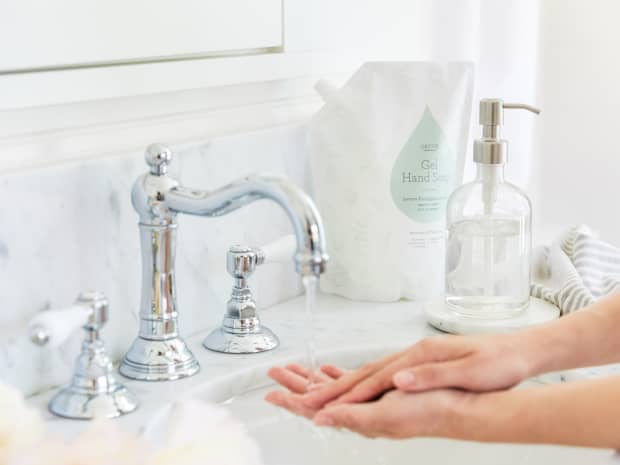
Step 1
For clean hands, wet the surface of your hands with fresh, running water. It can be hot, cold, or warm water, so no need to crank the heat.

Last Updated: June 29, 2021
“Wash your hands” is advice we’ve heard since we were kids, but research shows that not all of us heed it — or know how to do it in the most effective way. We're going to break down the differences between hand soap and hand sanitizer, how to use both effectively, and find out which is better at preventing illnesses.
We understand that doing the things the right way can be confusing, especially when you have to cut through all of the noise from the news, friends, family, and social media to find out the real facts. But can it be true that we really don't know how to clean our hands properly?
Well if you just learned that you should be washing your hands for at least 20 seconds like most of us did in 2020, then there are probably other things about handwashing you may not know. Plus, this 2018 study from the USDA found that people failed to properly clean their hands before meals 97% of the time. Hopefully, we've been a little better since then.
Come with us as we dig in to find out the real differences between soap and sanitizer and how to use both correctly. Plus, we’ve compiled the top advice from the Centers for Disease Control & Prevention (CDC), World Health Organization (WHO), U.S. Food & Drug Administration (FDA), our Grove Collaborative fellows, and doctors who specialize in hygiene and autoimmune function.
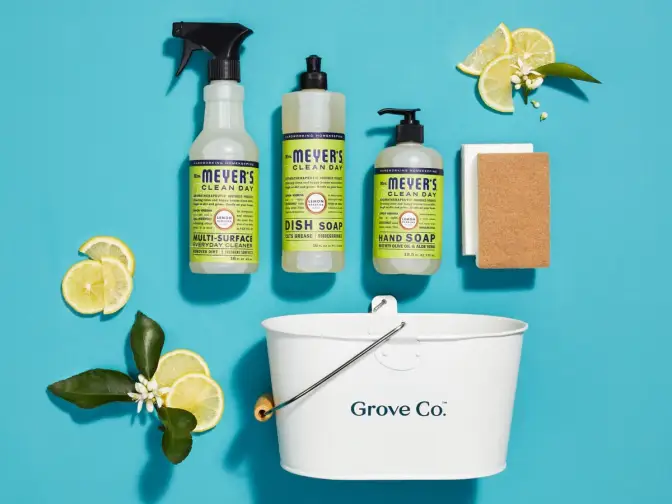
Wondering who Grove is, what types of products we offer, and how to get a free gift set when you sign up? Learn more about flexible monthly shipments, customizing your shipment, and joining millions of happy households — no monthly fees or commitments required.

For clean hands, wet the surface of your hands with fresh, running water. It can be hot, cold, or warm water, so no need to crank the heat.
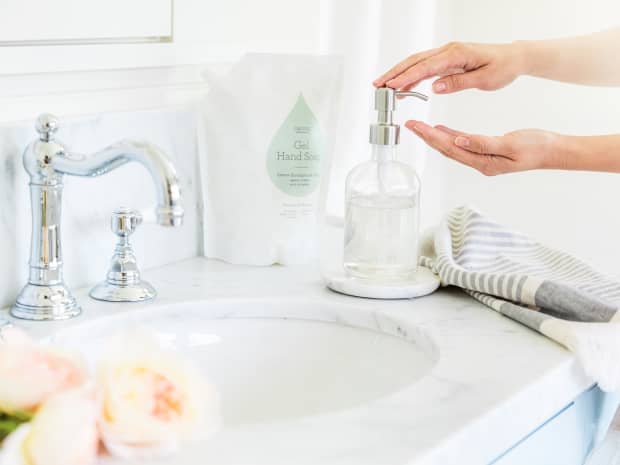
Turn off the tap and apply soap. Lather your hands together while applying soap, making sure to get the backs of your hands, between your fingers, and under your nails. Scrub for at least 20 seconds.
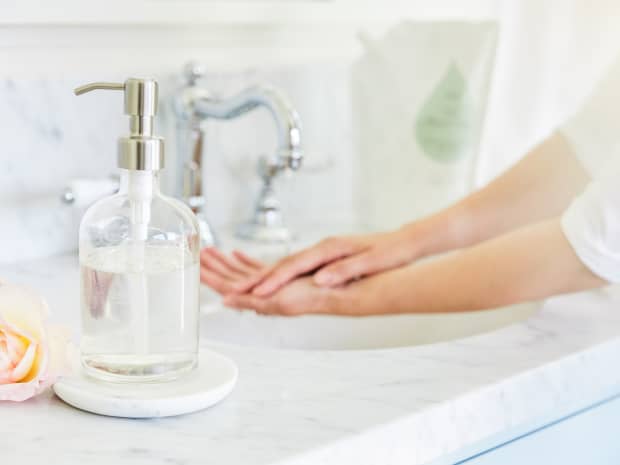
Rinse your hands under clean, running water.

Dry your hands using a clean towel or air dry. The WHO also recommends using a towel to turn off the faucet.
“You can't necessarily control what you touch. You can't control who else touched it. But you can look after your own hands.”
— Elizabeth Scott, PhD. and co-director of the Center for Hygiene and Health in Home and Community at Simmons University in Boston.

Tip 1: The 20-second recommendation for handwashing begins when you start with the soap and ends when you finish scrubbing — not when water first hits your hands or after you wash it off.
Twenty seconds is two “Happy Birthdays,” one rendition of the “ABCs”, or the chorus from Fleetwood Mac’s “Landslide” or Prince’s “Raspberry Beret,” but if you’re looking for other tunes to keep your handwashing interesting, check out this Twitter thread on 20-second choruses.
Tip 2: Wet your hands before applying soap, not vice versa.
Tip 3: The CDC recommends turning off the faucet while you scrub.
Tip 4 Hand towels may harbor germs; consider air drying or paper towels instead.
Hate the waste and environmental impact of paper towels? Check out our tree-free paper products by Seedling.
GROVE TIP
The FDA says antibacterial soap offers no additional protection vs. traditional hand soap, and may be doing more harm to the environment than good for your hands. In fact, the FDA ruled that 19 ingredients common in antibacterial soaps could no longer be marketed to consumers because they’re no more effective than non-antibacterial soap and may contribute to making bacteria resistant to antibiotics.
This one is easy: Whatever helps your family wash properly and often! If you have control over the soap, some studies suggest you should opt for a liquid or gel over foaming. This is largely due to the amount of time people in a study spent washing their hands, not due to the efficacy of foaming soap against viruses.
“Because foam washes off more quickly than gel soap, users are more likely to ‘splash and dash’ after a dollop of foam,” Elizabeth Scott, PhD. and co-director of the Center for Hygiene and Health in Home and Community at Simmons University in Boston, tells WebMD, referring to when people use water alone. "People tend to wash their hands for a shorter duration with the foam soap," says Ozlem Equils, MD, president of an educational nonprofit called MiOra, in the same article.
“From my perspective, the less you touch things in public places, the better.”
— David Chernoff, MD, Grove Collaborative Fellow and chief medical officer of SetPoint Medical.
The minimum percentage of alcohol the CDC recommends for hand sanitizers is 60 percent.
Studies have found that sanitizers with an alcohol concentration between 60–95 percent are more effective at killing germs than those with lower concentrations or non-alcohol-based hand sanitizers.
The CDC recommends applying hand sanitizer for 20 seconds. Cover all surfaces of both hands, and rub until hands are dry.
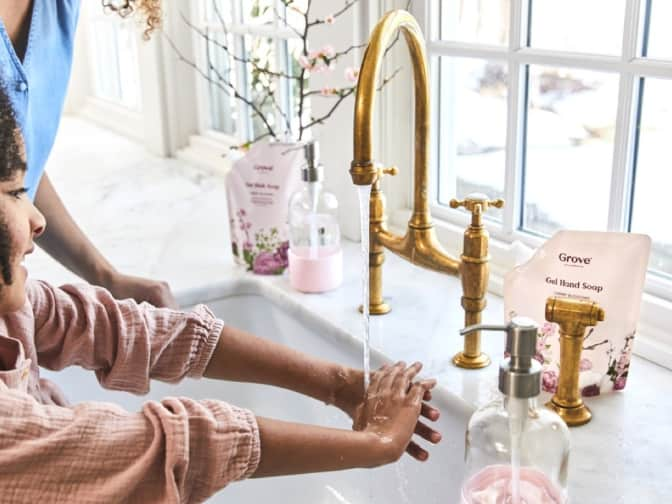
Science says: The CDC recommends washing with hand soap as the best choice, followed by hand sanitizer if soap and water isn’t accessible. Hand sanitizers do not get rid of all types of germs and might not be as effective as handwashing when hands are visibly dirty or greasy.
“I prefer hand soap: Hand sanitizer is typically an alcohol-based gel, and alcohol demethodates your skin,” says Dr. Chernoff. “In other words, if you ‘wash’ your hands with that, your hands afterwards feel very dry. Soap is gentler.”
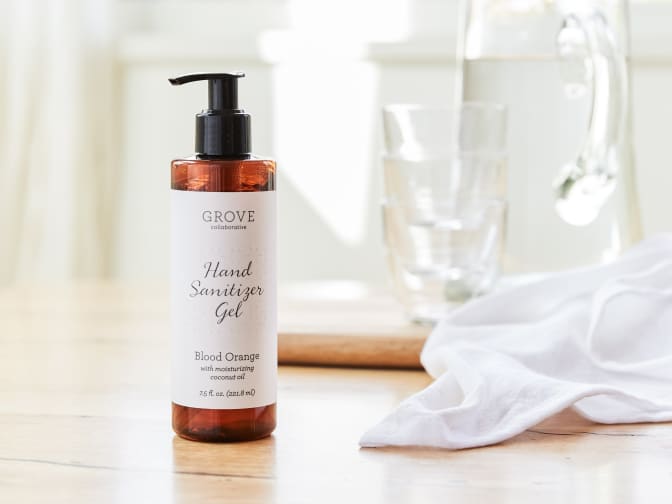
Waterless hand sanitizer says it all .. the benefit of sanitizer is that it's easy to use on the go, no water needed. So when you're out shopping or eating, getting a quick spritz of sanitizer helps clean your hands of germs quickly and easily.
The Minnesota Department of Health also lists these benefits of hand sanitizer:
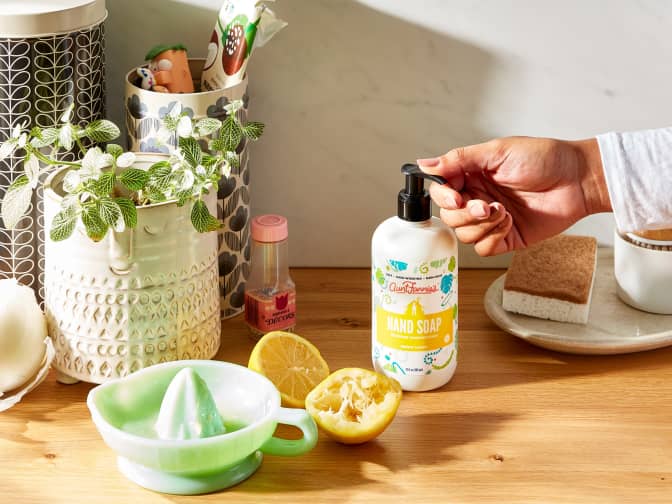
As mentioned above, if your hands are dirty with ... well, dirt ... hand sanitizer won't clean them. So although sanitizer removes germs from your hands it doesn't remove actual dirt, and dirt can cause illnesses or sickness too.
Washing your hands with soap and water (for the recommended 20 seconds) removes germs and dirt so your hands are fully clean.
“The key to avoiding infection is washing your hands with plain old soap,” says. Dr. Chernoff. “People use alcohol wipes and bleach wipes, and those are more appropriate if you want to clean surfaces like the steering wheel of your car. You can use antibacterial wipes, Clorox, any of those things that are alcohol based will do it, but they’re more drying.”

Science says: If soap and sanitizer isn’t available, any water is preferable to not washing, since the simple act of washing can remove germs physically. A 2011 study found that washing with water alone reduced bacteria (although not as much as washing with soap and water).
Dr. Chernoff agrees. “Plain soap, if used properly, disrupts the lipid membrane of the virus,” he says. “Even if you don’t have some, even if you wash your hands with just water, you reduce the risk.”
GROVE TIP
Science says: Most spirits do not contain enough ethyl alcohol to kill coronaviruses and other infectious diseases. An 80-proof spirit actually contains 40 percent ethyl alcohol, compared with the 60 percent shown to kill viruses similar to COVID-19.
Vodka maker Tito’s has even urged customers to not attempt to DIY with its products.

We've pulled the top 9 hand sanitizers rated by Grove members. Find one that's perfect for you and your family.
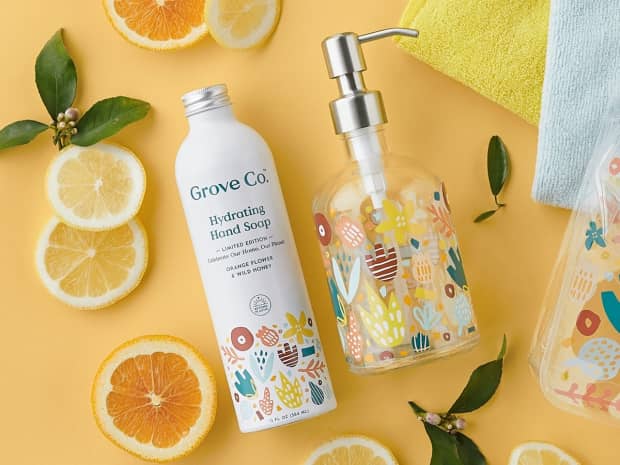
Find a moisturizing gel, liquid, or foaming hand soap that's top-rated by actual Grove members in this list of the 9 best soaps.

Learn about zero-waste laundry and hand soap sheets and how they actually work from Lead Grove Guide Angela Bell.

These are the most overlooked things in your home you should be cleaning right now. Did you ignore these spots too?